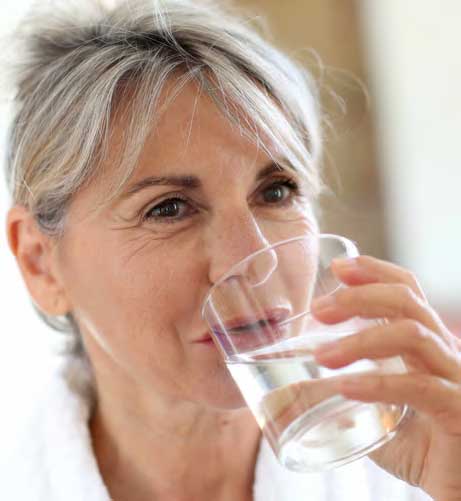 Lift up a glass of ice cold lemonade and drink to a healthier summer. Hydration for seniors is so important, especially as the temperature rises.
Lift up a glass of ice cold lemonade and drink to a healthier summer. Hydration for seniors is so important, especially as the temperature rises.
As you age, your body’s fluid reserve becomes smaller, your ability to conserve water is reduced and your thirst sense becomes less acute. These problems can be compounded by chronic illnesses such as diabetes and dementia, and by the use of certain medications.
That normal level of hydration varies widely from person to person. Contrary to the mantra that everyone should drink eight glasses of water every day, Dr. Kenney says there is nothing scientific to back that up. “People misinterpreted that it had to be liquid and it had to be water,” he says.
A person’s diet can greatly affect hydration levels: fruits (especially watermelon), vegetables, and soups are mostly water-based.
In general, larger people need to drink more water, as do athletes and those who perspire heavily, but that may mean more or less than eight glasses a day. “There is no one-size-fits-all remedy,” he says.
Perhaps because of the difficulty in diagnosis, elderly dehydration is a frequent cause of hospitalization (one of the ten most frequent admitting diagnoses for Medicare hospitalizations, according to the Health Care Financing Administration), and it can be life-threatening if severe enough.
SIGNS OF DEHYDRATION may include:
- Confusion
- Difficulty walking
- Dizziness or headaches
- Dry mouth
- Sunken eyes
- Inability to sweat or produce tears
- Rapid heart rate
- Low blood pressure
- Low urine output that may result in Urinary Tract Infections
- Constipation
- Leg cramps
If you suspect dehydration, you can check for a decrease in skin resilience by pulling up the skin on the back of the hand for a few seconds; if it does not return to normal almost immediately, the person is dehydrated.
PREVENTING DEHYDRATION
To avoid dehydration, a person should take in an adequate amount of fluids during the day; eat healthy, water-content foods such as fruit, vegetables and soups; checks that urine color is light and output adequate (dark urine or infrequency of urination is a classic sign of dehydration). Lemonade, flavored water, decaf coffee and specialty teas are enjoyable ways to add fluids to your diet.
Seniors should drink even when they’re not thirsty. Keeping a water bottle next to the bed or your favorite chair could help.
Mild dehydration can usually be treated by having the person take more fluids by mouth. Generally, it’s best to have the person drink something with some electrolytes, such as a commercial rehydration solution, a sports drink, juice, or even bouillon. But in most cases, even drinking water or tea will help.
With warm weather here, it is time to think “Drink More Water!”





 © 2025 Kirby Pines LifeCare Community. All Rights Reserved |
© 2025 Kirby Pines LifeCare Community. All Rights Reserved | 